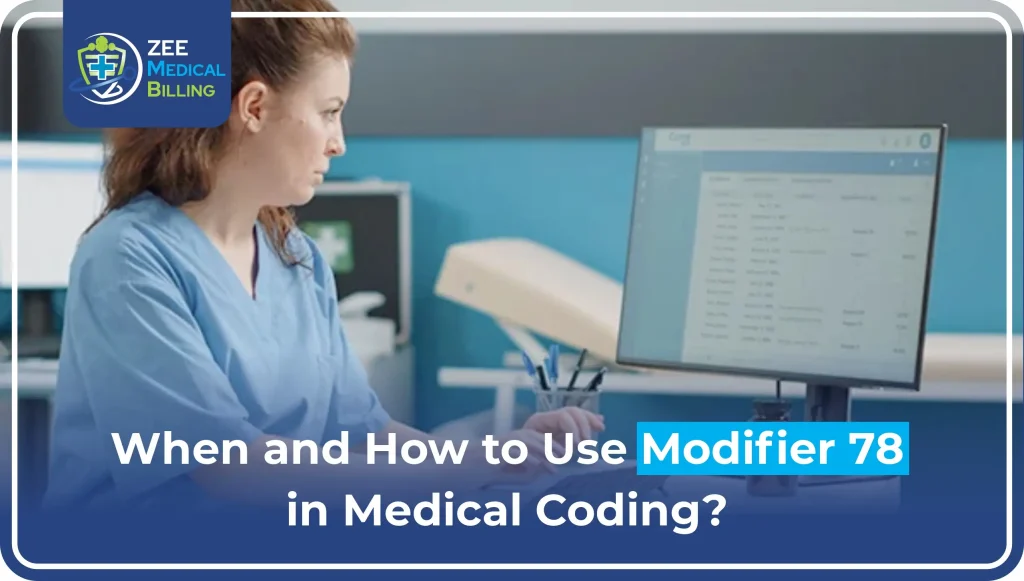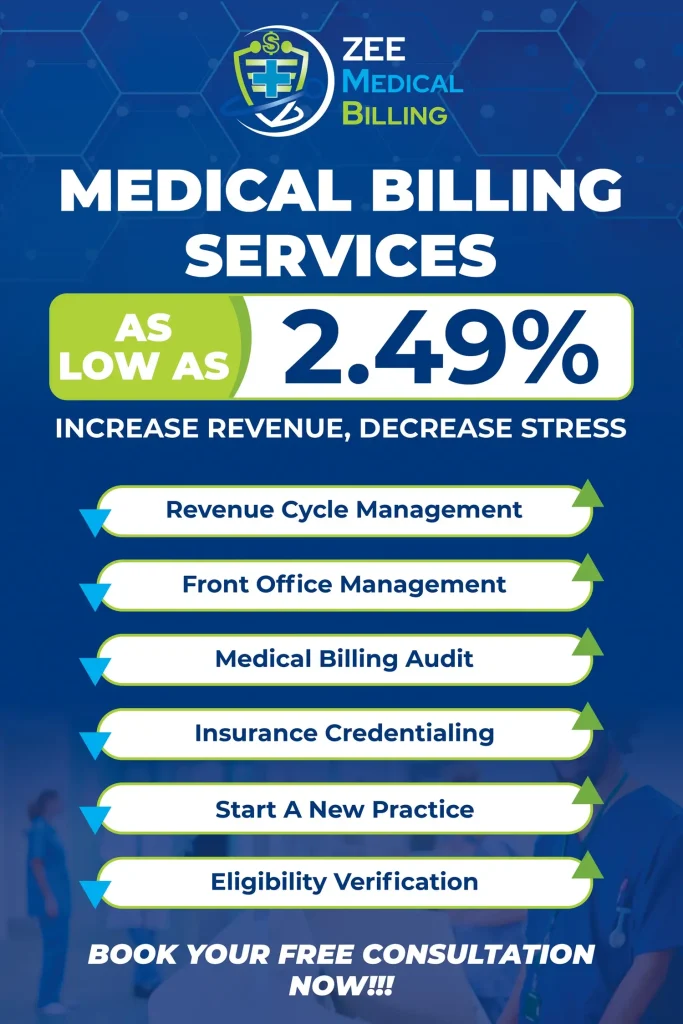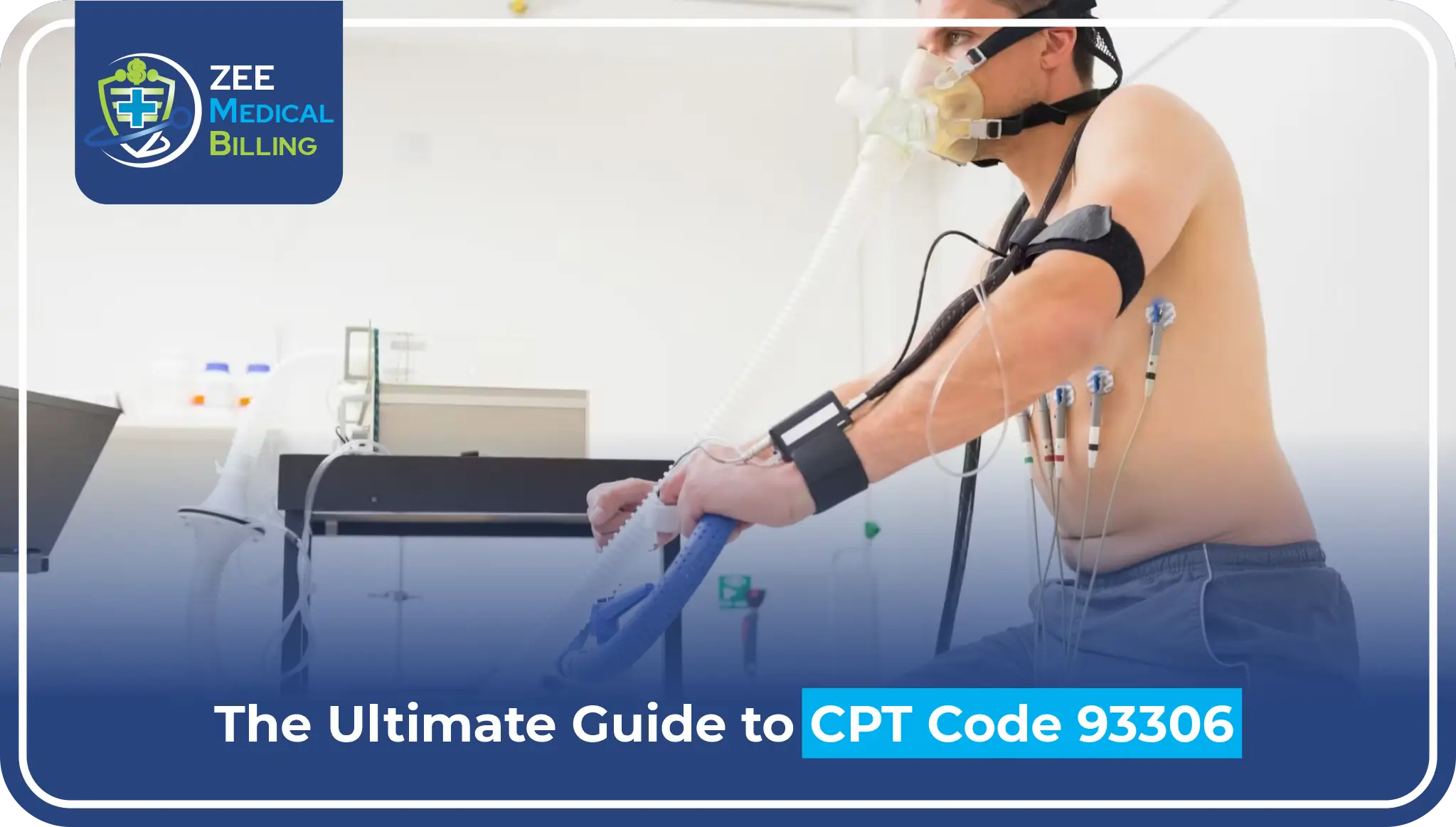Medical coding involves more than assigning codes — it’s about accurately reflecting clinical situations for proper billing and compliance. One important tool is Modifier 78. Healthcare providers use it in postoperative care when a patient needs an unexpected return to the operating room.
In this guide, you will learn what Modifier 78 is. You will see when to use it. We will compare it to similar modifiers like 58 and 79. You will also learn how to avoid common mistakes.
What Is Modifier 78?
CPT Modifier 78 Definition:
Modifier 78 means a doctor or qualified health care professional returns to the operating room. This happens after an initial procedure for a related issue during the recovery period.
Surgeons use Modifier 78 for unexpected follow-up surgeries. This applies when a patient requires another surgery during the recovery period following the first surgery. It shows that the new procedure comes from problems with the original one. The same provider will perform it.
Also Read: When and How to Use Modifier 77 in Medical Billing?
When Should Modifier 78 Be Used?
Use Modifier 78 when all the following conditions are met:
- The patient is within the global period (10 or 90 days) of the original procedure.
- The return to the operating/procedure room is unplanned.
- The original surgery relates to the second procedure.
- The same physician or group is performing the follow-up surgery.
Common Scenarios:
- Post-op infection requiring surgical drainage.
- Hematoma evacuation following a prior procedure.
- Wound dehiscence needs surgical closure.
- Bleeding complications leading to re-operation.
Important Characteristics of Modifier 78
| Attribute | Description |
| Related to original surgery? | Yes |
| Unplanned? | Yes |
| Global period? | Must be within the original procedure’s global period |
| Requires the same provider? | No – continues the original global period |
| Reimbursement effect | Reduced – covers intraoperative portion only |
| Related to the original surgery? | Yes |
Modifier 78 vs 58 vs 79: Key Differences
These three modifiers are often misunderstood or misused. Here’s a comparison to clarify:
| Feature | Modifier 58 | Modifier 78 | Modifier 79 |
| Purpose | Planned or staged procedure | Unrelated procedure during the global period | Unrelated procedure during global period |
| Planned/Unplanned | Planned | Unplanned | Unplanned |
| Related to prior surgery? | Yes | Yes | No |
| Unplanned return to the OR for complications | Yes | No | Yes |
| Same physician required? | Yes | Yes | Yes |
Quick Summary:
- Use Modifier 78 for unplanned, related returns to the operating room.
- Use Modifier 58 for planned, staged, or more extensive procedures.
- Use Modifier 79 for unrelated procedures during the global period.
Real-Life Examples of Modifier 78 Use
Example 1:
A patient undergoes abdominal surgery. Five days later, they developed a post-op infection requiring a return to the OR for incision and drainage. They would bill this with Modifier 78.
Example 2:
Following a hip replacement, a patient suffers from postoperative bleeding and is brought back to surgery. Since it’s an unplanned, related return within the global period, Modifier 78 applies.
Example 3:
A wound dehiscence repair is performed during the original procedure’s global period by the same surgeon. The team appends Modifier 78 to the repair procedure.
Documentation Requirements for Modifier 78
To ensure clean claims and proper reimbursement:
- Clearly describe the complication or reason for the return to surgery.
- Specify that the procedure was unplanned and related.
- Note that it occurred during the original global period.
- Mention that the same physician performed both procedures.
- Include operative reports and progress notes supporting medical necessity.
Also Read: When and How to Use Modifier 76 in Medical Billing?
Reimbursement Considerations
When using Modifier 78:
- The global period does not reset.
- They typically reduce reimbursement to cover only the intraoperative portion of the follow-up surgery.
- Insurance usually does not cover postoperative care for the second procedure. Many people see it as part of the first global package.
Related Modifiers to Understand
Here are some commonly used modifiers in postoperative care scenarios:
| Modifier | Description |
| 58 | Repeat the procedure by the same provider |
| 78 | Planned, staged, or more extensive procedure during the global period |
| 79 | Unrelated procedure during the global period |
| 76 | Unrelated E/M during the postoperative period |
| 24 | Unrelated E/M during postoperative period |
Understanding these helps ensure correct modifier usage and avoid denials.
FAQs
1. What is Modifier 78 used for?
Surgeons use Modifier 78 when a patient must return to the operating room unexpectedly. This happens during the global period of a past surgery. The provider handles the return because of a related complication.
2. Does Modifier 78 reset the global period?
No. One of the defining characteristics of Modifier 78 is that it does not reset the global period. The second procedure remains part of the original surgical event.
3. Is Modifier 78 only used for surgeries?
Medical professionals mainly use it for surgical CPT codes. This is especially true when they perform a procedure in an operating room or procedure room. People do not use it for E/M or diagnostic services.
4. Can unrelated procedures use Modifier 78?
No. If the follow-up procedure is unrelated, Modifier 79 should be used instead. Modifier 78 only applies to procedures related to complications from the original surgery.
5. What happens if Modifier 78 is used incorrectly?
Improper use can lead to claim denials or audits. Always confirm the timing, relation, and provider details. Clear documentation of medical necessity is crucial.
Final Thoughts
Modifier 78 plays an important role in capturing the clinical reality of surgical complications. It supports reimbursement for unplanned returns to the operating room while maintaining the integrity of the original global period. Proper usage requires careful attention to timing, documentation, and the relationship between procedures.
By knowing the differences between Modifier 78, 58, and 79, medical coders can bill correctly. They can also lower the chance of payer denials by documenting surgical events accurately.
Need Expert Medical Billing Services?
Zee Medical Billing provides professional billing solutions tailored to healthcare providers across the United States. In addition to offering top-tier support from our main office, we proudly serve clients in Illinois, Indiana, California, Kentucky, New York, Washington, Georgia, Alabama, South Carolina, Texas, Pennsylvania, Ohio, New Hampshire, Nevada, Massachusetts, Hawaii, Arizona, and Colorado! Whether you’re looking to streamline your revenue cycle or improve claims accuracy, you can reach out to us to learn more about how we can support your practice.









